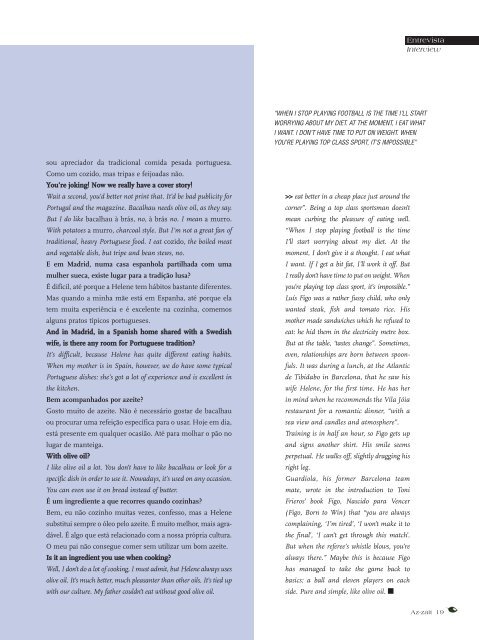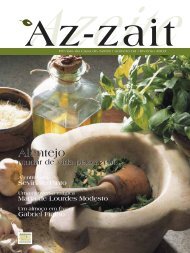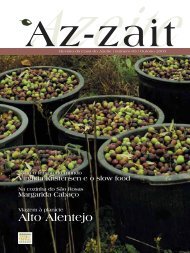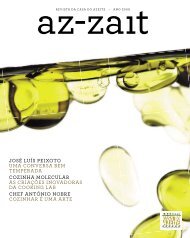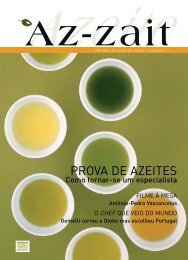Azeite n¼7 bilingue IDG - Casa do Azeite
Azeite n¼7 bilingue IDG - Casa do Azeite
Azeite n¼7 bilingue IDG - Casa do Azeite
You also want an ePaper? Increase the reach of your titles
YUMPU automatically turns print PDFs into web optimized ePapers that Google loves.
sou aprecia<strong>do</strong>r da tradicional comida pesada portuguesa.<br />
Como um cozi<strong>do</strong>, mas tripas e feijoadas não.<br />
You’re joking! Now we really have a cover story!<br />
Wait a second, you’d better not print that. It’d be bad publicity for<br />
Portugal and the magazine. Bacalhau needs olive oil, as they say.<br />
But I <strong>do</strong> like bacalhau à brás, no, à brás no. I mean a murro.<br />
With potatoes a murro, charcoal style. But I’m not a great fan of<br />
traditional, heavy Portuguese food. I eat cozi<strong>do</strong>, the boiled meat<br />
and vegetable dish, but tripe and bean stews, no.<br />
E em Madrid, numa casa espanhola partilhada com uma<br />
mulher sueca, existe lugar para a tradição lusa?<br />
É difícil, até porque a Helene tem hábitos bastante diferentes.<br />
Mas quan<strong>do</strong> a minha mãe está em Espanha, até porque ela<br />
tem muita experiência e é excelente na cozinha, comemos<br />
alguns pratos típicos portugueses.<br />
And in Madrid, in a Spanish home shared with a Swedish<br />
wife, is there any room for Portuguese tradition?<br />
It’s difficult, because Helene has quite different eating habits.<br />
When my mother is in Spain, however, we <strong>do</strong> have some typical<br />
Portuguese dishes: she’s got a lot of experience and is excellent in<br />
the kitchen.<br />
Bem acompanha<strong>do</strong>s por azeite?<br />
Gosto muito de azeite. Não é necessário gostar de bacalhau<br />
ou procurar uma refeição específica para o usar. Hoje em dia,<br />
está presente em qualquer ocasião. Até para molhar o pão no<br />
lugar de manteiga.<br />
With olive oil?<br />
I like olive oil a lot. You <strong>do</strong>n’t have to like bacalhau or look for a<br />
specific dish in order to use it. Nowadays, it’s used on any occasion.<br />
You can even use it on bread instead of butter.<br />
É um ingrediente a que recorres quan<strong>do</strong> cozinhas?<br />
Bem, eu não cozinho muitas vezes, confesso, mas a Helene<br />
substitui sempre o óleo pelo azeite. É muito melhor, mais agradável.<br />
É algo que está relaciona<strong>do</strong> com a nossa própria cultura.<br />
O meu pai não consegue comer sem utilizar um bom azeite.<br />
Is it an ingredient you use when cooking?<br />
Well, I <strong>do</strong>n’t <strong>do</strong> a lot of cooking, I must admit, but Helene always uses<br />
olive oil. It’s much better, much pleasanter than other oils. It’s tied up<br />
with our culture. My father couldn’t eat without good olive oil.<br />
Entrevista<br />
Interview<br />
“WHEN I STOP PLAYING FOOTBALL IS THE TIME I’LL START<br />
WORRYING ABOUT MY DIET. AT THE MOMENT, I EAT WHAT<br />
I WANT. I DON’T HAVE TIME TO PUT ON WEIGHT. WHEN<br />
YOU’RE PLAYING TOP CLASS SPORT, IT’S IMPOSSIBLE”<br />
>> eat better in a cheap place just around the<br />
corner”. Being a top class sportsman <strong>do</strong>esn’t<br />
mean curbing the pleasure of eating well.<br />
“When I stop playing football is the time<br />
I’ll start worrying about my diet. At the<br />
moment, I <strong>do</strong>n’t give it a thought. I eat what<br />
I want. If I get a bit fat, I’ll work it off. But<br />
I really <strong>do</strong>n’t have time to put on weight. When<br />
you’re playing top class sport, it’s impossible.”<br />
Luís Figo was a rather fussy child, who only<br />
wanted steak, fish and tomato rice. His<br />
mother made sandwiches which he refused to<br />
eat: he hid them in the electricity metre box.<br />
But at the table, ‘tastes change”. Sometimes,<br />
even, relationships are born between spoonfuls.<br />
It was during a lunch, at the Atlantic<br />
de Tibidabo in Barcelona, that he saw his<br />
wife Helene, for the first time. He has her<br />
in mind when he recommends the Vila Jóia<br />
restaurant for a romantic dinner, “with a<br />
sea view and candles and atmosphere”.<br />
Training is in half an hour, so Figo gets up<br />
and signs another shirt. His smile seems<br />
perpetual. He walks off, slightly dragging his<br />
right leg.<br />
Guardiola, his former Barcelona team<br />
mate, wrote in the introduction to Toni<br />
Frieros’ book Figo, Nasci<strong>do</strong> para Vencer<br />
(Figo, Born to Win) that “you are always<br />
complaining, ‘I’m tired’, ‘I won’t make it to<br />
the final’, ‘I can’t get through this match’.<br />
But when the referee’s whistle blows, you’re<br />
always there.” Maybe this is because Figo<br />
has managed to take the game back to<br />
basics: a ball and eleven players on each<br />
side. Pure and simple, like olive oil. ■<br />
Az-zait 19


